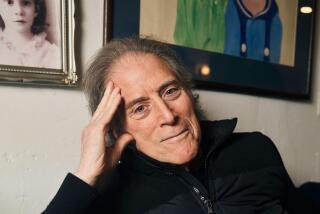From the Archives: Red Buttons, 87; Long Career No Joke
- Share via
Red Buttons, the impish former burlesque comic who became an early TV sensation and an Academy Award-winning character actor during a career that spanned more than seven decades, died Thursday. He was 87.
Buttons died of vascular disease at his home in Century City, his family said.
“Red was one of the few comedians who was a great actor, and he opened the doors to a lot of us,” comedian Jack Carter, a longtime friend, told The Times on Thursday.
Comic Norm Crosby, another friend, remembered Buttons as “one of the brightest, most creative” comedians.
“He made a whole career out of one routine: ‘I never had a dinner.’ It was just brilliant,” Crosby said. “He kept coming up with new lines all the time. That, to me, is what comedy is all about: keeping fresh and keeping current and changing with the times.”
A product of New York’s Lower East Side, Buttons had already performed in Minsky’s Burlesque and in Broadway plays and musicals by the time he became an overnight hit on television in 1952 with the launch of “The Red Buttons Show” on CBS.
A comedy-variety show, it featured the likable Buttons’ monologues, dance numbers and sketches with regulars and guests. Among the comic’s recurring characters were a punch-drunk prizefighter named Rocky Buttons, a juvenile delinquent called Muggsy and a dumb “dialect” German named Kleeglefarven.
The diminutive comic – 5 feet 6 and 140 pounds – inspired children around the country to mimic him singing his signature “Ho Ho Song,” in which he hopped around singing, “Ho Ho! Hee Hee! Ha Ha! Strange things are happening.”
The Academy of Radio and Television Arts and Sciences named Buttons Comedian of the Year in 1954.
But his time at the top on TV was short-lived.
His show’s popularity slipped in the second season and it was canceled. It was then picked up by NBC, which turned the variety show into a situation comedy in midseason before canceling it in the spring of 1955.
After the show was canceled, Buttons said years later, “I couldn’t get arrested.” Indeed, as he said at the time, “I found out how tough show business can be.”
Over the next two years, he worked only 14 weeks, primarily in nightclubs, with only three guest shots on “The Perry Como Show” and a role in a “Studio One” production.
But in late 1957 he was unexpectedly back on top with his dramatic supporting role in the screen adaptation of the James Michener novel “Sayonara,” starring Marlon Brando as a major who falls in love with a Japanese woman after he is assigned to an air base in Japan during the Korean War.
Buttons’ role as the tragic Airman Joe Kelly, who marries his Japanese sweetheart despite a military policy forbidding interracial marriage, earned him an Oscar and a Golden Globe for best supporting actor.
“I’m a little guy,” Buttons said at the time, “and that’s what I play all the time – a little guy and his troubles.”
Buttons appeared in more than 30 movies, including “Hatari!,” “The Longest Day,” “Harlow,” “Stagecoach” (the 1966 remake), “They Shoot Horses, Don’t They?,” “The Poseidon Adventure,” “18 Again!” and “It Could Happen to You.”
In 1966, he starred in the short-lived situation comedy “The Double Life of Henry Phyfe,” in which he played a bookkeeper who is asked to pose as a secret agent.
Buttons never equaled his early TV success or the high of his Oscar win, but he also never again stopped working. He appeared in TV movies and specials and made frequent series guest shots. He had a stint on “Knots Landing” in the 1980s and recurring roles on “Roseanne” in the ‘90s and in the Showtime series “Street Time” in 2002.
In the 1970s, he made frequent appearances on “The Dean Martin Celebrity Roast” shows, in which Buttons would begin his portion of the proceedings by noting, “Some of the most famous people in history never got a dinner!”
In the routine, as his friend Crosby recalled Thursday, “He’d say things like, ‘Venus de Milo, whose mother once said, “I never hear from you. What’s the matter? Can’t pick up a phone?” – never had a dinner.... ‘ “
A popular guest at testimonial dinners and other functions over the years, Buttons offered up one-liners, including: “Alexander the Great, who said on his wedding night, ‘It’s only a nickname’ ” and “George W. Bush, who said to Pope John Paul II, ‘Give us a visit and bring the missus.’ ”
“Red was incredibly well-schooled in comedy,” longtime friend Larry Gelbart, who was a writer on “The Red Buttons Show,” told The Times on Thursday.
“What was amazing about Red was the second career he had – not the acting, which was amazing enough, but as a toastmaster, a speaker. He took great pride in writing his own material.”
Born Aaron Chwatt in New York City on Feb. 5, 1919, Buttons spent his early years in tenements on the Lower East Side. His father, a Polish immigrant who made hats for a living, ignited his early desire to get into show business.
“He was a clown who liked to sing and dance,” Buttons told Newsday in 1995. “I picked that up from him. I noticed he made people happy, smiling, laughing, and that’s what I wanted to do.”
As a kid, Buttons sang for pennies on the street, encouraging donations by wearing a small sign that said, “I am an orphan.”
“That was my gimmick,” he recalled. “People were nice to orphans.”
Buttons’ family, which included his brother Joe and sister Ida, moved to the Bronx while he was in grammar school.
At 12, billing himself as Little Skippy and singing “Sweet Jennie Lee,” he won an amateur night contest at a local movie theater.
At 16 in 1935, he landed a job as a bellboy and singer at Dinty Moore’s Tavern on City Island in the Bronx. Customers, eyeing his red hair and uniform festooned with brass buttons, gave him the nickname that became his professional moniker.
That summer, Buttons made his first appearance on the Borscht Circuit. In exchange for room and board, he entertained at Greenfield Park in New York’s Catskill Mountains.
During a summertime stint at Loch Sheldrake in the Catskills after he graduated from high school, Buttons was spotted by a talent scout for burlesque impresario Harold Minsky. That led to a 17-week engagement at the Gaiety Theater in New York, followed by time on what was known as the Western Wheel circuit.
Buttons made his Broadway acting debut in a supporting role in “Vickie,” a farce at the Plymouth Theatre starring Jose Ferrer and Uta Hagen. He followed that by joining the “Wine, Women and Song” vaudeville-burlesque company at the Ambassador Theater in 1942.
After being inducted into the Army in 1943, Buttons joined the cast of “Winged Victory,” playwright Moss Hart’s Army Air Forces play to benefit Army Emergency Relief.
After 212 performances in New York, he re-created the role in the 20th Century Fox film version. That was followed by a 28-week “Winged Victory” tour.
He also had a stint with another Army unit in Europe in 1945, and that year he performed and served as master of ceremonies in a show for President Truman, British Prime Minister Winston Churchill and Soviet dictator Josef Stalin at the Potsdam Conference.
Back in New York after his discharge, Buttons appeared on Broadway in George Abbott’s musical “Barefoot Boy With Cheek” in 1947 and the 1948 musical “Hold It,” in which he impressed New York World-Telegram critic William Hawkins, who wrote: “The best out and out performance of the evening is Red Buttons, who comes into his own.... He can dress up comedy lines.”
Forty-seven years later, in 1995, a 76-year-old Buttons was still dressing up comedy lines with “Buttons on Broadway,” a one-man show filled with old stories and old jokes.
“I love to make ‘em laugh. I love to hear ‘em laugh. I love to entertain,” he told Back Stage magazine. “That’s my life. It’s always been my life.”
Buttons, who was married three times, is survived by his children, Amy and Adam; and his brother and sister.
The funeral will be private.
The family asks that any donations be made to Westside German Shepherd Rescue of Los Angeles, 2721 Wigtown Road, Los Angeles, CA 90064.
From the Archives: Marlon Brando, A Hollywood Iconoclast Who Transformed the Art of Acting
From the Archives: Dean Martin, Screen Star and Singer, Dies at 78
From the Archives: Eartha Kitt dies at 81; TV’s Catwoman, sultry singer of ‘Santa Baby’
From the Archives: Shelley Winters, 85; Oscar Winner Went From Bombshell to Respected Actress
From the Archives: Toshiro Mifune, Acclaimed Japanese Film Star, Dies
More to Read
Start your day right
Sign up for Essential California for the L.A. Times biggest news, features and recommendations in your inbox six days a week.
You may occasionally receive promotional content from the Los Angeles Times.






